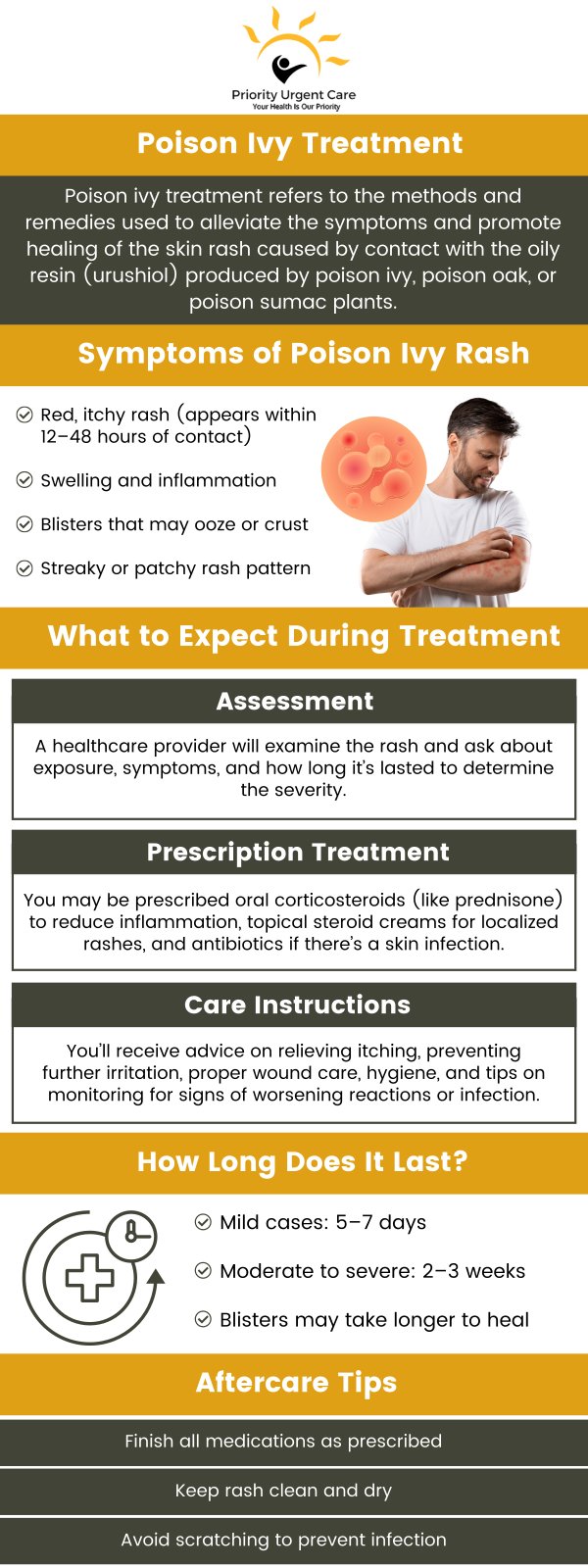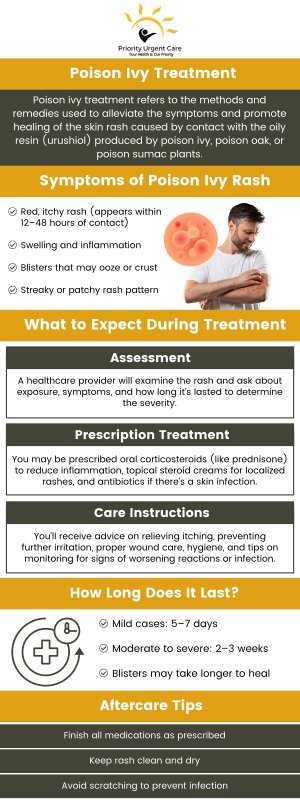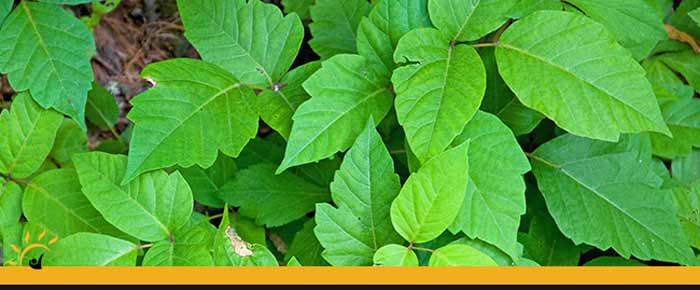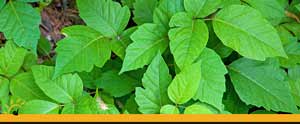Poison Ivy Treatment Clinic Q&A
Poison ivy is a common poisonous plant that causes a rash on the skin. If you or your child have come into contact with poison ivy and are experiencing a reaction, come to Priority Urgent Care & Walk-In Clinic. We can help you find relief. Contact us or schedule an appointment online! We have convenient locations to serve you in Cromwell, CT, East Haven, CT, Ellington, CT, Newington, CT, Oxford, CT, Unionville, CT and Wallingford, CT.




Table of Contents:
What is poison ivy?
How long does poison ivy rash last?
Can poison ivy spread on your body?
When should I see a doctor for poison ivy rash?
Poison ivy is the most common plant that causes an allergic reaction upon contact, alongside poison oak and poison sumac. When the oil on its leaves comes into contact with the skin, it can cause a rash or blisters and can be incredibly painful. Washing the oil from the skin prevents it from spreading, although it does not stop the reaction from occurring.
Poison ivy is a common wild plant that causes an extremely irritating allergic reaction when the oil from its leaves comes into contact with the skin. This reaction is known as contact dermatitis, a blistering rash that spreads over the skin on the areas that came into contact with the irritant. Most cases of poison ivy are mild and affect only a small area of the skin. However, in severe cases, a poison ivy rash can develop into extremely painful, swollen areas of skin filled with fluid and can cover significant portions of the skin.
Although the rash may take longer to appear with the first exposure, it usually appears within two days of exposure. The rash peaks five days after contracting poison ivy and begins to fade after seven to ten days. While some people who are exposed experience little or no effect, being totally immune to poison ivy is very unlikely and is considered extremely rare.
A poison ivy skin reaction occurs where the oil on the leaves comes in contact with your skin and is not contagious from place to place on your body. For example, if you have a rash on your hands, you cannot spread it to your legs or abdomen by touching these areas. However, if you have not washed your hands or body after exposure and the oil remains on your skin, it can come into contact with other areas of the skin and cause the same reaction.
In some cases, it may appear that the rash is spreading. This is due to the fact that the rash can develop more slowly in different parts of the body. In addition, if you are repeatedly exposed to contaminated objects with poison ivy oil on it, such as clothes, tools or even toys, you can experience a poison ivy rash again as long as there is oil present.
In most cases, poison ivy can be treated at home; however, there are some situations that will require medical attention or even emergency care. While most people have some sort of reaction to poison ivy, there are some who are allergic to the sap. This makes their reactions more severe and even life-threatening. If you or someone you know is experiencing any of these signs or symptoms, seek immediate medical attention:
• Severe swelling
• Swelling of the lips and tongue
• Shortness of breath or difficulty breathing
Even those who are not allergic to poison ivy may need to see a doctor if they develop complications or have a severe poison ivy reaction, such as:
• A rash that covers the face or genitals
• A rash that covers over a quarter of the body’s surface
• Breathing in smoke from burning poison ivy
• At-home treatment does not provide relief
Scratching a poison ivy rash or blisters can cause breaks in the skin that can become infected. See a doctor as soon as possible if you develop any signs or symptoms of an infection, such as:
• Pus or discharge from the skin
• A foul odor coming from the fluid in the blisters
• Increasing redness around the wound
• Increasing pain around the wound
• Fever
• Fatigue and a general feeling of being unwell
If you or someone you love has recently come into contact with poison ivy, come to Priority Urgent Care today! Our medical professionals are experienced in treating poison ivy and can help you recover more quicker. Call us today to book an appointment. We serve patients from Cromwell, CT, East Haven, CT, Ellington, CT, Newington, CT, Oxford, CT, Unionville, CT, Wallingford, CT, and BEYOND!

Additional Services You May Need
▸ Urgent Care
▸ DOT Physicals
▸ Worker’s Injury Treatment
▸ Drug Testing
▸ Physical Exams
▸ School/Sports Physicals
▸ Sports Injury Treatment
▸ X-Ray Services
▸ Pediatric Urgent Care
▸ Poison Ivy
▸ STD Testing
▸ Immunizations & Vaccinations
▸ Lab Testing
▸ Pre-Employment Physical
▸ Employer Services


